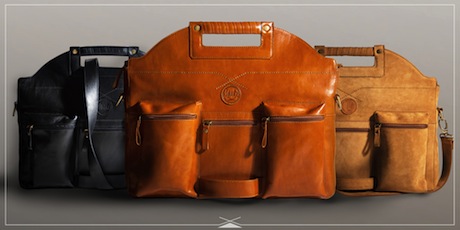Kickstarter and the Future of Shopping
Earlier this last year, I found myself at a Macy’s department store. As I walked through the aisles lined with polo shirts, twinsets and butter dish cozies, a big sign flashed overhead, urging me to “Be Impulsive.” Apparently, this was a campaign to promote their Impulse line of clothes–a play on words, but also a message: don’t think, buy. The definition of impulsive is, “acting or done without forethought”–surely a great strategy for making a satisfying, useful purchase.
Because we have featured a number of products that are being developed through Kickstarter, several new projects have contacted us to promote themselves. The other day, a new venture called Chivote let us know about a plain leather bag they are trying to bring to production. The bag, dubbed the “Boombox” because of its resemblance to 80s-era portable stereo equipment, acts as clutch, handbag, shoulder bag or backpack. It is classically styled, has all the features a modern bag should have (laptop and tablet sleeves, charger pockets, additional space for your sundries), is handmade in England and available in subtle, timeless colors. It’s simple, useful, classic and brilliant.
Chivote’s multi-functional design makes it a decent fit for the LifeEdited ethos of doing more with less. But a number of other Kickstarter ventures have reached out to us that don’t have an obvious place on our site, which is not to say they aren’t good ideas.
There was Huckleberry, which makes affordable, American made, customized shirts; Upstate Stock, which makes handmade woolen accessories; and Ledge stainproof pants, which makes, um, pants that don’t stain. All three successfully met their funding goals without our help. They did so because they were well made, smartly designed, stylish products. Presumably, the products that are not so well made, smartly designed or stylish do not get funded (though we’re sure some slip through the Kickstarter cracks).
What does this have to do with Macy’s “be impulsive” cri du guerre?
Kickstarter takes the exact opposite tack as traditional retail. It presents a product idea. It lets people decide whether this product needs to be made at all. It communicates with the people who might use the product. It lets those people invest in the product. If enough people invest and think it’s worth existing, you wait several months to receive the product. If not enough people think it’s a good idea and do not invest, you get your money back sans product. It’s a slow, deliberate process. It’s anything but impulsive.
Unfortunately for holiday shoppers, Kickstarter does not offer gift certificates (though you could give successfully funded projects as gifts). Much more important than addressing the temporal concerns of holiday shoppers, Kickstarter offers a different way to approach shopping any time of year. It begs us to ask whether something needs to exist. It asks us to invest time and money. It ties us to a greater body to determine something’s usefulness to the world, not just ourselves. More than anything, it discourages us from being impulsive (doesn’t the world have enough impulsively purchased products?). If Kickstarter were a store, it’d urge us to “be patient.” This is a good thing.
photo © Arno Mayorga






